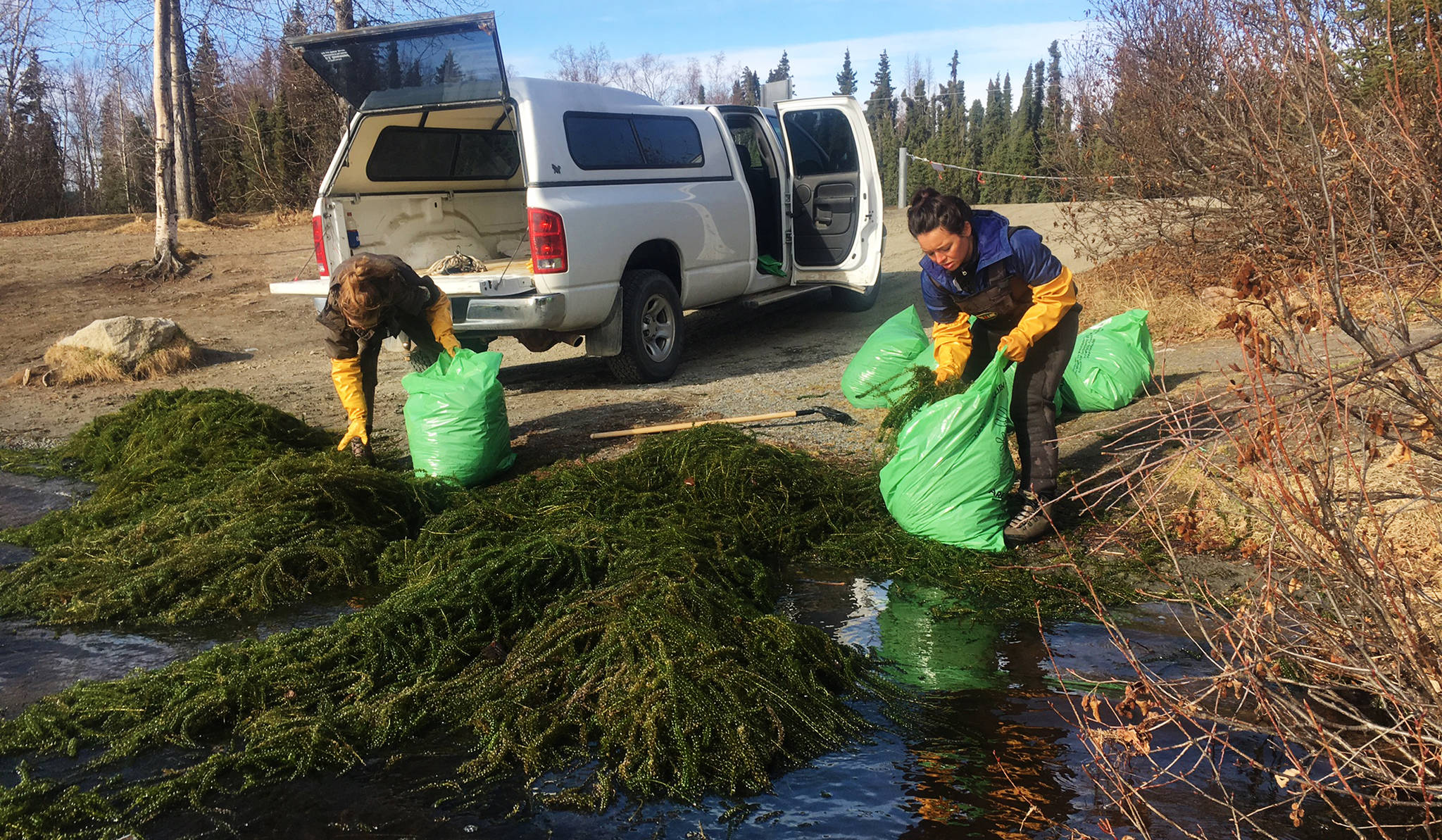A popular Soldotna-area lake infested with the invasive water-weed elodea may be getting its first dose of herbicide sooner than expected.
The Alaska Department of Environmental Conservation permit required to use the pesticides diquat and fluridone against elodea in Soldotna-area Sport Lake has a minimum 70-day permiting period which would have delayed the lake’s treatment until July. Now that DEC has granted an exemption for Sport Lake, the first herbicide applications are tentatively scheduled for May 16, according to Kenai National Wildlife Refuge supervisory biologist John Morton.
In February, Alaska Department of Fish and Game workers discovered elodea growing beneath the ice of Sport Lake, which is heavily visited in the summer by boaters and fisherman drawn by its state-maintained boat launch and Fish and Game-stocked population of coho and rainbow trout. Elodea grows in thick columns that can suffocate fish and entangle boats and floatplanes, several of which moor at private docks on Sport Lake’s shores. Able to reproduce by fragmentation, elodea has spread through Alaskan lakes via boat propellers and floatplane rudders, and has been the target of a statewide eradication campaign since 2012.
When Kenai National Wildlife Refuge staff searched for elodea in Sport Lake on March 13, drilling holes through the ice around the lake’s perimeter, they discovered the weed in six of the 28 holes they drilled. Refuge workers visited the lake again after ice melted this weekend for more intensive sampling. Morton said they found elodea so dense it was impossible to walk through.
“It’s stunning,” Morton said. “It’s really thick. It’s a different kind of growth form than what we’ve seen in Nikiski.”
Three Nikiski Lakes — Stormy, Beck, and Daniels Lake — were previously infestated with elodea, which was elminated with diquat and fluridone in 2014 and 2015.
The Sport Lake elodea had formed free-floating mats — which Morton said it might do in order to stay near the top of the iced-over water column in winter, becoming rooted in summer months. Wind blew it near the boat launch, creating an opportunity for removal. Workers from the Refuge and the Kenai Watershed Forum used rakes attached to long chains to pull it ashore. On Thursday, the group filled about 30 trash bags with the tangled strands.
Kenai Watershed Forum Invasives Specialist Jennifer Peura was among those working the rakes. She said the Sport Lake elodea was longer, more vibrantly green and healthier-looking than what she’d seen in the Nikiski lakes, and said the difference may be due to either environmental factors or variation in elodea, which has several different strains that sometimes hybridize. Morton speculated that the Sport Lake elodea belongs to a different population than that found in Nikiski, and said samples from the lake will be genetically tested for more information.
Having discovered the elodea during winter might allow the eradicators to kill it in the early spring before native vegetation emerges and recreaters gather at the lake, but the DEC permit’s 30-day public comment period and a minimum 40-day wait period would have held up the treatment until the middle of summer. Peter Johnson of the Alaska Department of Natural Resources’ Plant Materials Center applied for the DEC permit on April 3.
DEC may grant exceptions to the 70-day minimum permitting period in situations that pose a “risk to human health, risk to the environment, or economic loss,” according to Alaska Administrative Code. The agency has done so for at least one other elodea treatment — that in Anchorage’s Lake Hood, a busy floatplane base that was successfully treated with diquat and fluridone in summer 2015.
In the case of Sport Lake, DEC commissioner Larry Hartig issued an emergency exemption for its permit on May 2, allowing treatment to begin. DEC spokesperson Candice Bressler wrote in an email that though the treatment can take place, the permit’s public comment period remains open. Morton said other state permits for the herbicides are finished or expected to be finished soon.
During a public meeting on April 12, presenters from elodea-fighting groups said the Sports Lake boat launch would likely be closed this summer to prevent the weed from spreading via boat propellors. However, that decision has changed. Though the boat launch’s state managers — the Alaska Department of Fish and Game — will restrict its hours during May, it will be open from 2 p.m to 9 p.m Wednesday through Sunday, when a Fish and Game staffer will be present to inspect and wash elodea fragments from boats and trailers emerging from the lake. On Monday and Tuesday, the launch ramp will be closed with a cable.
Normally, Morton said, physically raking elodea out of the lake would be an ineffective way to eliminate it, and could actually help the plant spread by creating fragments that could grow into new colonies. However, the wind conditions and the upcoming herbicide treatment created an opportune moment to drag it out. “Because it was all clustered there, we decided to get it in bags and get it out of the way, partly because it really reduces the risk of a floatplane grabbing it and carrying it off,” Morton said.
Reach Ben Boettger at ben.boettger@peninsulaclarion.com.

